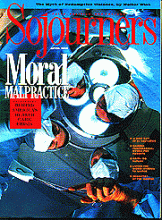I am often amazed by the talents unleashed upon the community of faith. This month's Worthy of Note is devoted to some remarkable musicians who combine a rare blend of faithfulness and thirst for justice. Good music, good lyrics, good politics, good folks.
Good Folks
The first few cuts of Carrie Newcomer's solo debut, Visions and Dreams (Windchime Promotions, P.O. Box 3040, West Lafayette, IN 47906), remind me musically and spiritually of the Indigo Girls. On a couple other tunes, her deep, rich, and gritty vocals and lyrics make me think of Holly Near. All in all, though, Newcomer creates a feeling that is distinctly her own. I suspect that as a singer and songwriter, she will be inspiring many of us for quite some time.
Formerly of the group Stone Soup (Long Fields and October Nights), Newcomer's recent release is transitional, both as a solo recording and with some new instrumentation. In addition to some cool acoustic/vocal pieces, the electronic numbers are pretty exciting.
The result is a recipe for success. With balanced portions of instrumental and vocal, Newcomer has come up with a delightful sound. Her strong voice needs strong accompaniment; but too much instrumentation would override this voice as adept with love songs as songs of dissent.
The recording opens with "Visions and Dreams," a tough little number that offers a contemporary interpretation of the old scriptural image. Newcomer dubs harmony over melody, singing, "It's never too late to look ahead/There's a whole eternity in front of you/It's never too late to live right now/And really be who you want to be....I take on faith what I cannot see/'Cause the older ones are seeing things/and the younger ones are dreamin' dreams."
Read the Full Article

